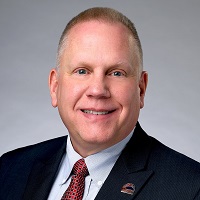Beyond Banking: How Credit Unions Serve Their Communities
Credit unions differentiate themselves from traditional banks by operating as member-owned financial cooperatives focused on community support and service rather than shareholder profit.


Profit and prosper with the best of Kiplinger's advice on investing, taxes, retirement, personal finance and much more. Delivered daily. Enter your email in the box and click Sign Me Up.
You are now subscribed
Your newsletter sign-up was successful
Want to add more newsletters?

Delivered daily
Kiplinger Today
Profit and prosper with the best of Kiplinger's advice on investing, taxes, retirement, personal finance and much more delivered daily. Smart money moves start here.

Sent five days a week
Kiplinger A Step Ahead
Get practical help to make better financial decisions in your everyday life, from spending to savings on top deals.

Delivered daily
Kiplinger Closing Bell
Get today's biggest financial and investing headlines delivered to your inbox every day the U.S. stock market is open.

Sent twice a week
Kiplinger Adviser Intel
Financial pros across the country share best practices and fresh tactics to preserve and grow your wealth.

Delivered weekly
Kiplinger Tax Tips
Trim your federal and state tax bills with practical tax-planning and tax-cutting strategies.

Sent twice a week
Kiplinger Retirement Tips
Your twice-a-week guide to planning and enjoying a financially secure and richly rewarding retirement

Sent bimonthly.
Kiplinger Adviser Angle
Insights for advisers, wealth managers and other financial professionals.

Sent twice a week
Kiplinger Investing Weekly
Your twice-a-week roundup of promising stocks, funds, companies and industries you should consider, ones you should avoid, and why.

Sent weekly for six weeks
Kiplinger Invest for Retirement
Your step-by-step six-part series on how to invest for retirement, from devising a successful strategy to exactly which investments to choose.
Credit unions have always stood apart from other financial services providers. Not because of clever marketing or sleek technology, but because of how and why they were first built.
They weren't created to generate profit for shareholders. They were formed by people — teachers, postal workers, church groups, manufacturing employees — who needed access to fair financial services when traditional banks wouldn't serve them.
That origin story still defines what credit unions are today: financial cooperatives shaped by the needs of their members, with missions grounded in service and community support.
From just $107.88 $24.99 for Kiplinger Personal Finance
Become a smarter, better informed investor. Subscribe from just $107.88 $24.99, plus get up to 4 Special Issues

Sign up for Kiplinger’s Free Newsletters
Profit and prosper with the best of expert advice on investing, taxes, retirement, personal finance and more - straight to your e-mail.
Profit and prosper with the best of expert advice - straight to your e-mail.
Kiplinger's Adviser Intel, formerly known as Building Wealth, is a curated network of trusted financial professionals who share expert insights on wealth building and preservation. Contributors, including fiduciary financial planners, wealth managers, CEOs and attorneys, provide actionable advice about retirement planning, estate planning, tax strategies and more. Experts are invited to contribute and do not pay to be included, so you can trust their advice is honest and valuable.
That structure changes everything. When you're owned by your members instead of outside investors, you don't operate at arm's length from the people who use your services.
The organization is accountable in a very real way through advisory boards, member feedback and daily interactions that reflect the communities you live and work in.
The credit union model prioritizes people over profit. It's not a branding gimmick; it's really how they work. Every dollar deposited is used to support other members, whether through loans, services or reinvestment in local programs.
This shows up in ways that go well beyond account openings and loan approvals.
A real-life example of doing good
In the past year, our credit union, Affinity Federal Credit Union, helped organize a large-scale food drive that gathered thousands of pounds of groceries for families facing food insecurity, working in tandem with other credit unions in New Jersey.
We also facilitated financial education workshops offered at no cost to high school students and underserved adults. The program gave people the tools to make sound financial decisions, regardless of where they banked.
These projects weren't designed to promote products or boost membership. They were delivered because there was a clear need for them in our communities.
You'll find similar stories at credit unions across the country. Many provide support during crises, run clothing and school supply drives and offer emergency grants to members who experience hardship.
Others create financial access points for first-generation savers or families who've historically been left out of traditional financial systems. These efforts are rooted in trust and shared purpose, meeting short-term needs and building long-term relationships.
It's all about accountability
Because credit unions are structured as cooperatives, accountability flows from the ground up. Every member has a vote.
That kind of governance means decisions tend to reflect the lived experiences of real people in the communities being served — not detached metrics or quarterly projections. It also creates a sense of shared responsibility.
When a credit union succeeds, it does so by helping its members and its community succeed, not the other way around.
Looking for expert tips to grow and preserve your wealth? Sign up for Building Wealth (soon to be called Adviser Intel), our free, twice-weekly newsletter.
Financial relationships at most institutions often feel transactional. Credit unions offer something more connected.
When members walk into a branch, they often know with whom they're talking. Their concerns are heard, not passed along to three or four different customer service representatives on a single phone call.
Neighbors helping neighbors
That consistency matters. So does the fact that the staff coaching someone through their first savings account or working with a small business on a loan probably lives in the same neighborhood, sends their kids to the same schools and shops at the same grocery store.
This kind of proximity makes credit unions more responsive. They aren't locked into rigid product lines or corporate strategies. They can build programs and resources that reflect the specific needs of their members.
That flexibility helps credit unions serve in ways that national financial institutions often can't replicate.
In my decades in the credit union space, I've seen firsthand how this model supports people's lives, not just their financial goals. It works because it's built on trust, consistency and shared goals.
There's no pressure to serve distant stakeholders. The focus is local, and the benefits are mutual. Our staff members listen, support and stay connected with our members over time.
That's why credit unions are embedded in the communities they serve.
Related Content
- Best Credit Unions 2025
- Four Reasons Credit Unions Are a Good Bet in Unsettled Times
- How Financial Institutions Can Blend Tech With Human Connection
- Five Perks of Choosing Local or Regional Financial Institutions
- How Your Financial Institution Can Help You Dig Out of Debt
Profit and prosper with the best of Kiplinger's advice on investing, taxes, retirement, personal finance and much more. Delivered daily. Enter your email in the box and click Sign Me Up.

Kevin Brauer, a distinguished finance industry professional with over three decades of experience, has been at the helm of Affinity Credit Union as CEO and President since January 2023. His substantial contribution to Affinity over the past seven years has been instrumental in propelling the firm's value proposition and innovating its financial well-being initiatives. Brauer leads Affinity's dedicated team of 500 employees at its Basking Ridge, N.J., headquarters and throughout its 18-plus branches.
-
 Quiz: Do You Know How to Avoid the "Medigap Trap?"
Quiz: Do You Know How to Avoid the "Medigap Trap?"Quiz Test your basic knowledge of the "Medigap Trap" in our quick quiz.
-
 5 Top Tax-Efficient Mutual Funds for Smarter Investing
5 Top Tax-Efficient Mutual Funds for Smarter InvestingMutual funds are many things, but "tax-friendly" usually isn't one of them. These are the exceptions.
-
 AI Sparks Existential Crisis for Software Stocks
AI Sparks Existential Crisis for Software StocksThe Kiplinger Letter Fears that SaaS subscription software could be rendered obsolete by artificial intelligence make investors jittery.
-
 5 Top Tax-Efficient Mutual Funds for Smarter Investing
5 Top Tax-Efficient Mutual Funds for Smarter InvestingMutual funds are many things, but "tax-friendly" usually isn't one of them. These are the exceptions.
-
 Why Invest In Mutual Funds When ETFs Exist?
Why Invest In Mutual Funds When ETFs Exist?Exchange-traded funds are cheaper, more tax-efficient and more flexible. But don't put mutual funds out to pasture quite yet.
-
 Social Security Break-Even Math Is Helpful, But Don't Let It Dictate When You'll File
Social Security Break-Even Math Is Helpful, But Don't Let It Dictate When You'll FileYour Social Security break-even age tells you how long you'd need to live for delaying to pay off, but shouldn't be the sole basis for deciding when to claim.
-
 I'm an Opportunity Zone Pro: This Is How to Deliver Roth-Like Tax-Free Growth (Without Contribution Limits)
I'm an Opportunity Zone Pro: This Is How to Deliver Roth-Like Tax-Free Growth (Without Contribution Limits)Investors who combine Roth IRAs, the gold standard of tax-free savings, with qualified opportunity funds could enjoy decades of tax-free growth.
-
 One of the Most Powerful Wealth-Building Moves a Woman Can Make: A Midcareer Pivot
One of the Most Powerful Wealth-Building Moves a Woman Can Make: A Midcareer PivotIf it feels like you can't sustain what you're doing for the next 20 years, it's time for an honest look at what's draining you and what energizes you.
-
 Stocks Make More Big Up and Down Moves: Stock Market Today
Stocks Make More Big Up and Down Moves: Stock Market TodayThe impact of revolutionary technology has replaced world-changing trade policy as the major variable for markets, with mixed results for sectors and stocks.
-
 I'm a Wealth Adviser Obsessed With Mahjong: Here Are 8 Ways It Can Teach Us How to Manage Our Money
I'm a Wealth Adviser Obsessed With Mahjong: Here Are 8 Ways It Can Teach Us How to Manage Our MoneyThis increasingly popular Chinese game can teach us not only how to help manage our money but also how important it is to connect with other people.
-
 Looking for a Financial Book That Won't Put Your Young Adult to Sleep? This One Makes 'Cents'
Looking for a Financial Book That Won't Put Your Young Adult to Sleep? This One Makes 'Cents'"Wealth Your Way" by Cosmo DeStefano offers a highly accessible guide for young adults and their parents on building wealth through simple, consistent habits.